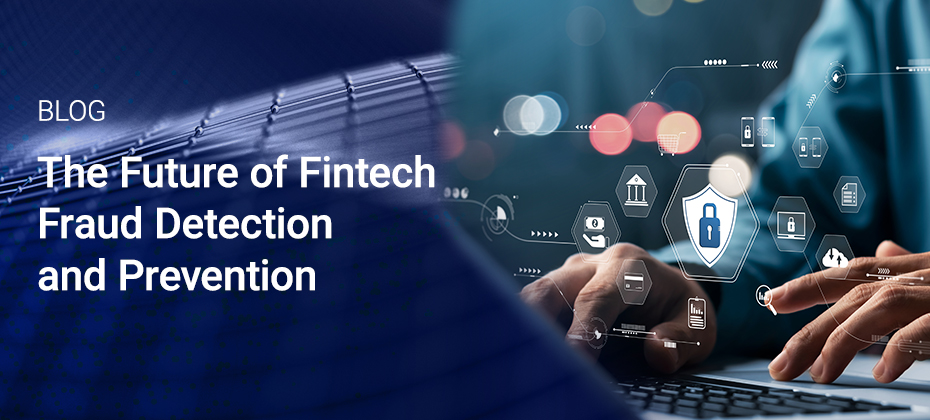Tag: fintech fraud

In this article...Understanding the scope of fintech fraudThe importance of fintech fraud preventionSynthetic identity (ID) fraud: A growing threatHow fintech fraud detection and prevention are evolvingGet started today The integration of technology with traditional financial services has unlocked unprecedented convenience and opportunities for consumers and businesses alike. However, this digital shift has opened the door for more sophisticated fraud tactics. With fraudsters continuously refining their methods, fintech companies must invest in advanced fintech fraud detection and prevention solutions. Understanding the scope of fintech fraud As fintech platforms expand, they also attract the attention of cybercriminals. The accessibility of digital financial services can create vulnerabilities that fraudsters exploit, executing everything from personal account takeovers to larger-scale breaches involving synthetic identities. Source: Experian’s U.S. Identity & Fraud Report To counter these threats, fintech companies must deploy innovative fraud management solutions powered by artificial intelligence (AI), machine learning (ML), and advanced analytics. Unlike traditional methods that often rely on static rules and manual reviews, these solutions can process vast amounts of data, learn from historical patterns, and detect anomalies in real-time. This allows organizations to identify suspicious activities before they lead to significant losses. The importance of fintech fraud prevention While detecting fraud is crucial, preventing it from occurring in the first place is even more important. Fraud prevention solutions aim to create robust systems that stop fraudsters in their tracks before they can cause damage. With the rise of digital financial services, the need for proactive fraud prevention measures has never been greater. These solutions protect both consumers and businesses from financial harm, reducing the risk of financial loss and reputational damage. Advanced fraud prevention solutions employ multilayered strategies, combining AI-driven fraud detection tools with methods such as multifactor authentication and biometric identity verification. These tools create an extra layer of security, making it difficult for fraudsters to access sensitive data or execute fraudulent transactions. Experian’s fraud prevention solutions offer businesses a comprehensive suite of tools designed to prevent various types of fraud. From real-time transaction monitoring to sophisticated user authentication methods, these solutions provide the protection businesses need to stay ahead of evolving fraud tactics. Synthetic identity (ID) fraud: A growing threat One of the most concerning forms of fraud that fintech companies face is synthetic ID fraud. This type of fraud involves the creation of a fake identity using a combination of real and fabricated information. Fraudsters often steal pieces of personal data — such as Social Security numbers or addresses—and then combine them with fictional information to create a new, synthetic identity. These synthetic identities can be used to open bank accounts, apply for credit cards, or take out loans, leaving businesses and consumers vulnerable to significant financial losses. Synthetic ID fraud is particularly difficult to detect because the synthetic identity often looks legitimate to traditional verification systems. As a result, fintech companies must deploy sophisticated fraud detection systems that can identify synthetic identities before they’re used to commit fraud. Machine learning algorithms, for instance, can analyze behavioral data, detecting discrepancies that may indicate a synthetic identity. Experian is ranked #1 by the Center for Financial Professionals (CeFPro®) for Identity and Fraud. The ranking appeared in CeFPro’s Fintech Leaders Report, a comprehensive annual study of the fintech industry. How fintech fraud detection and prevention are evolving As fraudsters continue to evolve their tactics, fintech companies must remain one step ahead by investing in cutting-edge fraud detection and prevention technologies. Real-time monitoring, predictive analytics, and biometrics are just a few of the technologies shaping the future of fraud detection. By integrating these technologies into their fraud management processes, fintech companies can offer a more secure and seamless experience for their users. With the acquisition of NeuroID, an industry leader in behavioral analytics, Experian has amplified its fraud risk suite by providing a new layer of insight into digital behavioral signals and analytics. Available through our fraud solutions on the Experian Ascend PlatformTM, clients can proactively monitor and analyze a user’s real-time digital behavior, allowing them to confidently navigate the online landscape and provide frictionless customer experiences. Get started today As the fraud landscape continues to evolve, fintech companies must adopt comprehensive solutions to stay ahead of emerging threats. By doing so, they can protect themselves and their customers, ensuring the continued success of digital financial services in the years to come. To learn more, check out our fraud management and fintech solutions. Fraud management solutions Fintech solutions

Trust is the primary factor in any business building a long-lasting relationship, especially when a company operates globally and wants to build a loyal customer base. With the rapid acceleration of digital shopping and transactions comes a growing fraud landscape. And, given the continual increase of people wanting to transact online, marketplace companies – from ecommerce apps, ridesharing, to rental companies – need to have ideal strategies in place to protect themselves and their customers from fraudulent activities. Without ideal risk mitigation or comprehensive fraud and identity proofing strategies, marketplaces may find themselves facing the following: Card-not-present (CNP) Fraud: As online shopping increases, customers can’t provide a credit card directly to the merchant. That’s why fraudsters can use stolen credit card information to make unauthorized transactions. And in most cases, card owners are unaware of being compromised. Without an integrated view of risk, existing credit card authentication services used in isolation can result in high false positives, friction and a lack of card issuer support. Unverified Consumer Members, Vendors, Hosts & Drivers: From digital marketplace merchants like Etsy and Amazon, to peer-to-peer sharing economies like AirBnB, Uber and Lyft, the marketplace ecosystem is prone to bad actors who use false ID techniques to exploit both the platform and consumers for monetary gain. Additionally, card transaction touchpoints across the customer lifecycle increases risks of credit card authentication. This can be at account opening, account management when changes to existing account information is necessary, or at checkout. Buy Now, Pay Later (BNPL) Muling: While a convenient way for consumers to plan for their purchases, experts warn that without cautionary and security measures, BNPL can be a target for digital fraud. Fraudsters may use their own or fabricated identities or leverage account takeover to gain access to a legitimate user’s account and payment information to make purchases with no intent to repay. This leaves the BNPL provider at the risk of unrecoverable monetary losses that can impact the business’ risk tolerance. Forged Listings & Fake Accounts: Unauthorized vendors that create a fake account using falsified identities, stolen credit cards and publish fake listings and product reviews are another threat faced by ecommerce marketplaces. These types of fraud can happen without the vast data sources necessary to assess the risk of a customer and authenticate credit cards among other fraud and identity verification solutions. By not focusing on establishing trust, fraud mitigation management solutions and identity proofing strategies, businesses can often find themselves with serious monetary, reputational, and security qualms. Interested in learning more? Download Experian’s Building Trust in Digital Marketplaces e-book and discover the strategies digital marketplaces, like the gig economy and peer-to-peer markets, can take to keep their users safe, and protected from fraudulent activity. For additional information on how Experian is helping businesses mitigate fraud, explore our comprehensive suite of identity and fraud solutions. Download e-book

“As an industry, fintech is known for creating compelling and personalized online journeys. But that experience can suffer if the fraud-prevention routines are perceived as burdensome by consumers,” said Kathleen Peters, Chief Innovation Officer for Experian’s Decision Analytics business, in a recent Q&A article with Finovate. With the proliferation of the digital world, managing digital identity and “getting it right” is crucial. However, as much as it is an opportunity, leveraging consumer identity data can also create a stumbling block for some organizations. Peters cited Experian’s annual Global Identity and Fraud Report, specifically, the consumer concern around online security and the need for industry players to find the right balance between security and a frictionless experience. “In short, we need the right fraud-prevention treatment for the right transaction; it is not a one-size-fits-all exercise,” Peters said. The interview also covered the importance of knowing a customer’s identity for compliance reasons and business use cases, dispelling the myth that banks’ efforts around personalization are considered “creepy” by consumers, and the best ways for banks and fintechs to build trust among their consumers. According to Experian’s Global Identity and Fraud Report, consumers are willing to give entities they trust more data, particularly if they feel they are receiving value. And it’s undeniable that data is at the heart of personalization and building better relationships. “It comes down to identifying and understanding consumers and their needs. The best way to do that is with a lot of data,” Peters said. To read the full article, visit Finovate’s website. Finovate: Experian CIO on Digital Identity, Personalization and Building Trust with Consumer Data Learn more about Experian Identity

Experian was recently named a global fintech leader in the Center for Financial Professionals (CeFPro) Fintech Leaders 2022 report, ranking among the report’s top companies within the Credit Risk and Fraud Prevention categories, and in the top 15 Overall Ecosystem Rankings, rising five places from 2021. This award comes at a time where fraud and identity management services are of utmost importance given the rise of digital channels and activity; and as risk management strategies continue to be a priority – especially in times of economic volatility. “This recognition as a fintech leader by industry peers is a testament to how Experian partners with businesses and consumers to enable fintechs with innovative solutions and insights to mitigate credit risk and make better decisions,” said Jon Bailey, Vice President of Fintech at Experian. “Despite times of rapid change, Experian has been and remains committed to focusing on helping our clients with a wide range of challenges by providing valuable solutions. It’s great to see our continued efforts and investments driving positive impact. We will continue to invest and innovate to enable our clients for growth and create opportunities to support their customer-first missions.” Over the past year, Experian has placed bets on helping open-up credit to underserved communities, adapting to changing consumer expectations, addressing the growing threat from fraud, and becoming a more agile technology provider in an ever-changing market while helping clients mitigate credit risk. To learn more about Experian’s solutions that power fintechs, visit our fintech solutions page here. Click here for the full press release and to read more about the award.

Although half of businesses globally report an increase in fraud management over the past 12 months, many still experience fraud losses and attacks. To help address these challenges, Experian held its first-ever Fintech Fraud & Identity Meetup on February 5 in San Francisco, Calif. The half-day event was aimed at offering insights on the main business drivers of fraud, market trends, challenges and technology advancements that impact identity management and fraud risk strategy operations. “We understand the digital landscape is changing – inevitably, with technology enhancements come increased fraud risk for businesses operating in the online space,” said Jon Bailey, Experian’s Vice President of Fintech. “Our focus today is on fraud and identity, and providing our fintech customers with the tools and insights needed to grow and thrive.” The meetup was attended by number of large fintech companies with services spanning across a broad spectrum of fintech offerings. To kick off the event, Tony Hadley, Experian’s Senior Vice President of Government & Regulatory Affairs, provided an update on the latest regulatory news and trends impacting data and the fintech space. Next followed a fraud and identity expert panel, which engaged seasoned professionals in an in-depth discussion around two main themes 1) fraud trends and risk mitigation; and 2) customer experience, convenience, and trust. Expert panelists included: David Britton, Experian’s Vice President of Industry Solutions; Travis Jarae, One World Identity’s Founder & CEO; George Kurtyka, Joust’s Co-Founder & COO; and Filip Verley, Airbnb’s Product Manager. “The pace of fraud is so fast, by the time companies implement solutions, the shelf-life may already be old,” Britton said. “That is the crux – how to stay ahead. The goal is to future-proof your fraud strategy and capabilities.” At the close of the expert panel, Kathleen Peters, Experian’s Senior Vice President Head of Fraud and Identity, demoed Experian’s CrossCore™ solution – the first smart, open, plug-and-play platform for fraud and identity services. Peters began by stating, “Fraud is constant. Over 60% of businesses report an increase in fraud-related losses over the past year, with the US leading the greatest level of concern. The best way to mitigate risk is to create a layered approach; that’s why Experian invented CrossCore.” With the sophistication of fraudsters, it’s no surprise that many businesses are not confident with the effectiveness of their fraud strategy. Learn more about how you can stay one step ahead of fraudsters and position yourself for success in the ever-changing fraud landscape; download Experian’s 2019 Global Identity and Fraud Report here. For an inside look at Experian’s Fintech Fraud & Identity Meetup, watch our video below.

2018 was a whirlwind of a year – though it was not surprising when Google’s 2018 “most-searched” list showed Fornite GIFs ruled the internet, Black Panther was the most-Googled movie, and the Keto diet was trending (particularly in late December and early January, go figure). But, while Google’s most-searched terms of 2018 present pure pop-culture entertainment, they miss the mark on the trends we find most meaningful being principals of the financial services industry. What about the latest news in fintech? According to Business Insider, fintech companies secured $57.9 billion in funding in the first half of 2018 alone, nearing the previous annual record of $62.5 billion set in 2015. Taking it a step further, CBInsights reports that 24 of 39 fintech unicorns are based in North America. We won’t blame Google for this oversight. Faced with the harsh reality that the “most-searched” results are based on raw-data, perhaps it’s possible that people really do find Fortnite more exciting than financial services trends – but not us at Experian. We have been closely following disruption in the financial services space all while leading the charge in data innovation. When competing in environments where financial institutions vie for customer acquisition and brand loyalty, digital experience is not enough. Today’s world demands finance redefined – and fintechs have answered the call. Fintechs are, by far, among the most innovative technology and data-driven companies in the financial services industry. That’s why we built a team of seasoned consultants, veteran account executives and other support staff that are 100% dedicated to supporting our fintech partners. With our expert team and a data accuracy rate of 99.9%, there isn’t a more reliable fintech source. Perhaps this is one financial services trend that Google can’t ignore (we see you Google)! For more information regarding Experian’s fintech solutions, check out our video below and visit Experian.com/fintech.

How can fintech companies ensure they’re one step ahead of fraudsters? Kathleen Peters discusses how fintechs can prepare for success in fraud prevention.